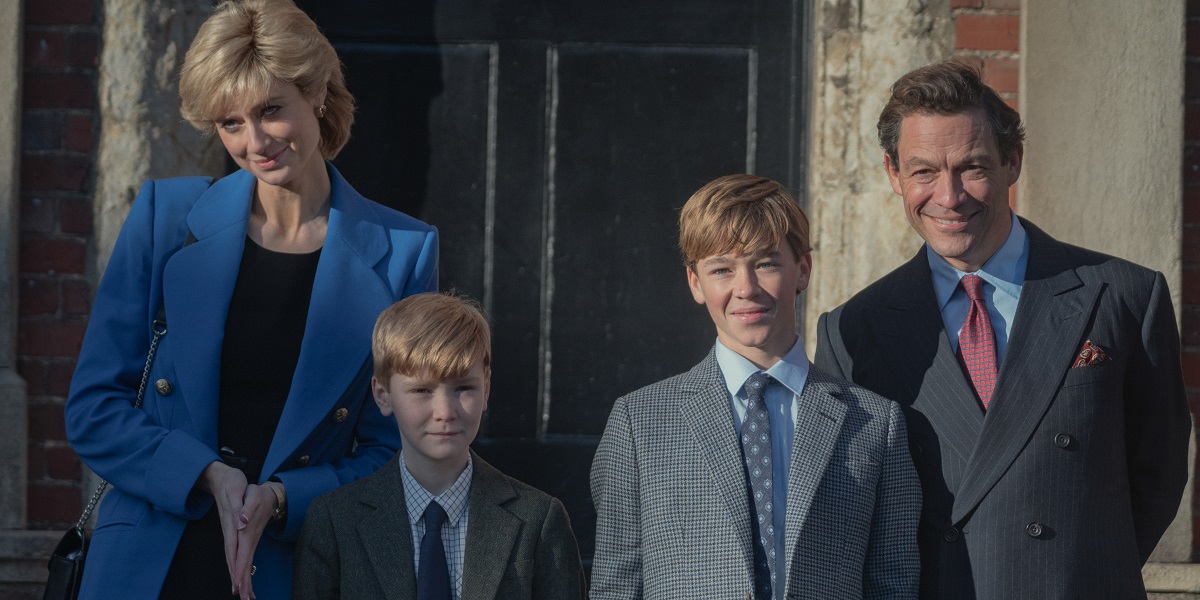For its first four seasons, “The Crown” was a near-flawless prestige drama series. Part of the series’ magic was its ability to craft a sense of urgency; it was the first time the audience visualized intense crises—like the aftermath of King Edward VIII’s abdication, the relationship between Princess Margaret and Group Captain Peter Townsend, the discovery of the Marburg Files—from the perspective of the institution threatened by those emergencies. But as the series has moved forward in time, it has begun to stumble. Season Five is replete with terrific performances, especially from actors in recurring roles, but it’s no longer enough. Writer and creator Peter Morgan’s vision, like the monarchy circa 1990, is showing signs of strain.
Season Five begins with Prince Charles (Dominic West) and Princess Diana (Elizabeth Debicki) struggling to maintain a facade of normalcy. Whether they succeed in pulling this off is something their family constantly monitors via checking a half dozen newspapers, every day, rain or shine. In addition to fretting about their son and future king, Queen Elizabeth (Imelda Staunton) and Prince Philip (Jonathan Pryce, quite good) struggle to keep a grip on their other children’s lives as well. The 1990s must have been a whale of a time for posh divorce lawyers in England: Princess Anne (Claudia Harrison) comes to her mother seeking permission for a divorce, as does Prince Andrew (James Murray, vastly underrated). After a taped conversation of dull dirty talk between Charles and his mistress Camilla Parker Bowles (the ever-wonderful Olivia Williams) is leaked to the press, he and Diana separate. Charles bares all in a 1994 televised interview, admitting to adultery. A satellite to this endless parade of dysfunction is Prime Minister John Major (Jonny Lee Miller), a Conservative trying to prevent the Crown from spending large sums of taxpayer money, while also trying to preserve the Windsors’ existence as a core part of British life.
It is painful to find fault with the man who cemented Detective Jimmy McNulty (“The Wire”) in TV history, but Dominic West is one of Season Five’s missteps. It’s not entirely his fault. During Seasons Three and Four, Josh O’Connor brought extraordinary vulnerability and nuance, far beyond his years, to playing the young Charles. His accent was flawless; in interviews, O’Connor has mentioned using Charles’ tic (of, when getting out of a car, checking each cufflink, his pocket square, then waving to the crowd) as a way to get into character. Such background work is absent in West’s performance. His accent and general affect feel like a rehashing of Hector Madden, the matinee idol news anchor West played on BBC’s “The Hour.” It’s a shame, because as characterized by Morgan, Charles’ heart is in the right place. His life cannot begin until his mother’s ends; his ideas to modernize the monarchy make sense; had the real Charles been able to implement them while his mother was alive, it might have helped the institution seem like something more than a tourist trap.

Another casting decision that has diminished the series’ depth is that of the Queen herself. Staunton’s Elizabeth is flat, like a painting on a commemorative tea tray, given to prissy defensiveness. Morgan’s writing for the Queen (and especially for Queen Elizabeth the Queen Mother, who over the course of five seasons has gone from being kindly to Machiavellian to annoying) often feels confused. In conversation with her daughter-in-law, right after she insists that all anyone wants is for Diana to be happy, the Queen scold-brags that she and Philip will celebrate their 47th wedding anniversary soon. To make matters worse, for anyone who grew up on the Harry Potter books and films, Staunton as Elizabeth will look, and sound, like a sartorially conservative Dolores Umbridge.
Now for some good news: After “The Night Manager” and “Tenet,” this is the third, and hopefully final, time Elizabeth Debicki plays a fragile, glamorous woman trapped in an abusive relationship. Not because she can’t do the job. On the contrary, Debicki’s Diana picks up exactly where Emma Corrin’s left off. The latter perfected that bashful chin-tuck, doe-eyed upward glance known the world over, but Debicki wisely builds upon that foundation. She packs over 15 years of agony and loneliness into the graceful, swanlike bend of her neck and back; misery has caked under her eyes like the kohl she uses on both lashlines. During Season Five, Diana is often alone at home, putting on a disguise to sneak into the movies with a boyfriend, or taking clandestine meetings with dishonorable BBC journalists. Debicki truly soars when she distinguishes the public-facing Diana—posing in photo calls with her adulterous husband as his future queen, smiling, waving—from the one abandoned by all who knew her.
The emotional devastation Debicki conveys intensifies when there is neither dialogue nor a scene partner. Like Matt Smith (Prince Philip in Seasons One and Two) and Vanessa Kirby (Princess Margaret, Seasons One and Two), Debicki knows she’s playing a mercurial figure with a lot of personality. All three use their characters’ individual experiences of physical and psychological torment to create a wall between their true selves and everyone else. But only Philip and Margaret are safe, having long given up fighting the system. Diana, as she puts it in an interview with Martin Bashir (Prasanna Puwanarajah, walking a fine line between dishonest and sincere), battled to the end.

Tragically underused is the magnificent Lesley Manville. Very few actors take pleasure in their craft the way she does. Helena Bonham Carter’s portrayal of Princess Margaret was terrific, but sometimes felt brittle and one-note. There is a deep, abiding brokenness in Manville’s Margaret—after divorcing Count Snowdon the Princess never remarried and smoked herself into oblivion—but there is also wry self-awareness and dignity. Nowhere is this more apparent than when the Princess reunites, at a party, with an elderly Peter Townsend (Timothy Dalton, doing more acting here than in the rest of his career). That the episode dovetails between the fleeting joy Margaret feels, dancing in the arms of the man she’d promised herself to, drinking and laughing with him, and the 1992 fire that damaged Windsor Castle, could easily turn into lazy symbolism. Margaret, however, treats her sister to a blistering monologue, weaving somewhat tipsily around a room, drink firmly in hand, admonishing Elizabeth’s self-pity and asking whether she can even bring herself to admit that she destroyed her only sister’s dreams. Manville and Staunton are frequent Mike Leigh collaborators, so I was hopeful some of that intense chemistry would have a chance to take root and flourish. Alas, as I’m sure Margaret herself would agree, there’s not nearly enough Margaret in “The Crown.”
There is one standout episode, which benefits from mostly not featuring the bickering Windsors. “Mou Mou,” directed superbly by Alex Gabassi, explores the life and motivations of multimillionaire Mohamed Al-Fayed. Amir El-Masry plays the young Al-Fayed, and I could’ve easily sat through an entire season exploring the life of the scrappy Egyptian businessman. El-Masry’s performance is joyous but controlled, and my heart just about sank when he holds aloft his newborn son, promises to protect him, and names him Dodi. Salim Daw plays an older Mohamed, now the owner of the Hotel Ritz in Paris, whose adult son is off producing films (including the Oscar winner for Best Picture “Chariots of Fire”). The day he buys the Ritz, Mohamed fires a black waiter, whom Dodi later tells him is Sidney Johnson (an excellent Jude Akuwudike), former valet to King Edward VIII. Al-Fayed promptly hires him back and asks to be tutored in all things British. Daw’s onscreen partnership with Akuwudike is sensational. The latter brings a dignity and emotional depth to his role that even some of the Windsors can’t drum up. As for Daw, it’s a genuine treat to watch all his efforts to be ratified by the British royal family—including buying Harrod’s!—get rejected at every turn, until he invites Diana, whom he knows socially, to holiday with him, his wife, and his son Dodi, in July 1997. A month later, the Windsors, and the world, would never be the same.
Whole season screened for review. “The Crown” is now available on Netflix.












